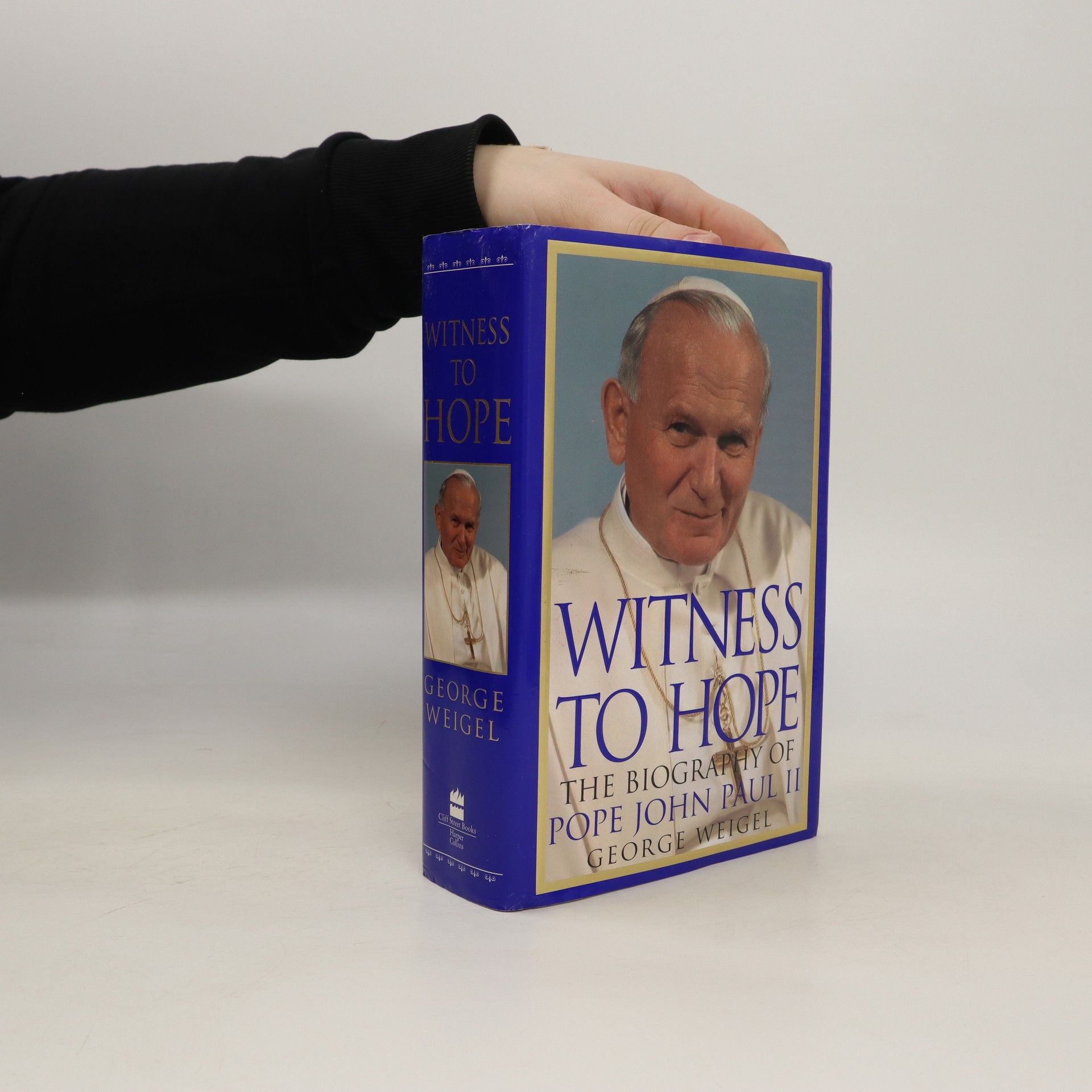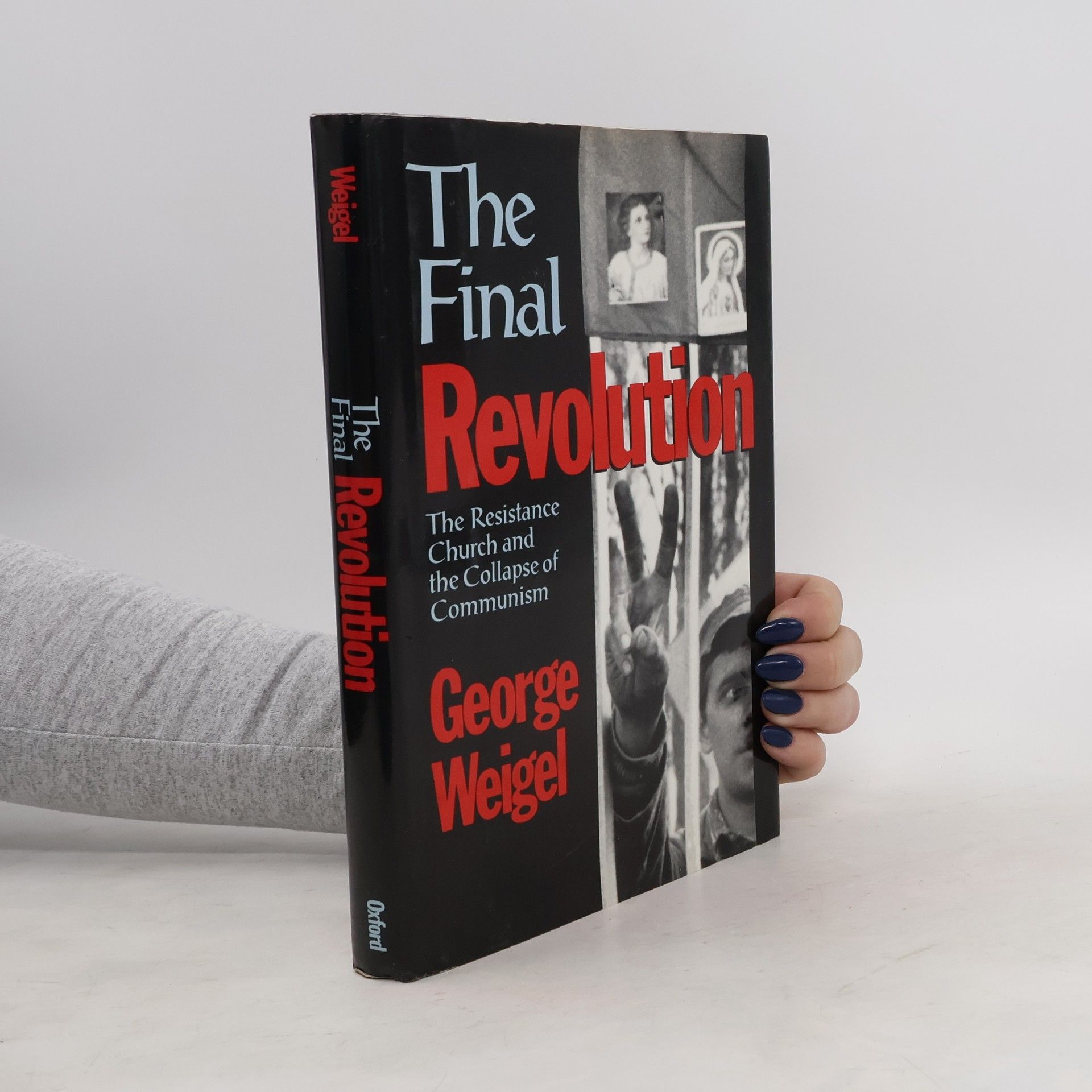Świadek nadziei, z nowym wstępem do polskiego wydania, to bestsellerowa biografia papieża, próba opowiedzenia o tym, jaki był Karol Wojtyła, człowiek wezwany do Rzymu „z dalekiego kraju”, który został Janem Pawłem II, kanonizowanym w 2014 roku. George Weigel pokazuje nam, co kształtowało postawę i duchowość papieża oraz decydowało o kierunku jego myśli i działań. Książka bazuje na rozmowach z przyjaciółmi i współpracownikami ojca świętego, wypowiedziach osobistości z kręgów religijnych, politycznych i artystycznych, a także na archiwalnych dokumentach oraz prywatnej korespondencji papieża.
George Weigel Book order (chronological)
This American author and political activist primarily engages with ethics and public policy, often focusing on the relationship between religion and liberal democracy. His work explores the challenges of a free society within the context of capitalism, emphasizing the moral dimensions of political life. He acts as a significant intellectual voice seeking to connect theological thought with the practical issues of the contemporary world. His analyses are valuable for understanding the deeper philosophical underpinnings of political and social systems.







Kres i początek jest próbą podsumowania pontyfikatu papieża, którego George Weigel nazywa Janem Pawłem Wielkim. Książka jest zarówno uzupełnieniem, jak i kontynuacją bestsellerowej biografii Jana Pawła II, zatytułowanej Świadek nadziei. „Im dłużej rozmyślam nad pontyfikatem Jana Pawła II, tym bardziej jestem przekonany, że stanowił on punkt zwrotny w dziejach Kościoła, przełom bardzo ważny wobec mającej obecnie miejsce konfrontacji religii z postmodernistycznym światem” – mówi George Weigel i przedstawia w książce portret człowieka, który pokazał światu moralne bankructwo komunistycznej ideologii.
Sobór Watykański II był kluczowym wydarzeniem w historii katolicyzmu, mającym ogromny wpływ na Kościół Powszechny. Rozpoczął nową epokę, a jego nauki i decyzje budzą kontrowersje do dziś. Wiele osób, w tym teologów i dziennikarzy, wskazuje na ten sobór jako źródło współczesnych problemów Kościoła, takich jak laicyzacja, rewolucja seksualna oraz kryzys rodziny. Wyzwaniem stało się także przekazywanie wiary przyszłym pokoleniom. W książce autor, George Weigel, wybitny amerykański teolog, broni Soboru, podkreślając jego znaczenie i aktualność nauczania w kontekście poszukiwania głębszej wolności. Teksty soborowe pozostają kluczowym źródłem dla Kościoła, który dąży do ewangelizacji, realizując swój pierwotny cel. Weigel, pisząc z pasją, ukazuje prawdziwe znaczenie Soboru Watykańskiego II oraz drogę do uświęcenia każdego człowieka i całej społeczności. W obliczu odrzucenia Tradycji i Kościoła, autor proponuje powrót do korzeni i odnowę wiary, koncentrując się na Chrystusie jako centrum tego procesu.
To Sanctify the World
- 368 pages
- 13 hours of reading
A leading Catholic intellectual argues that the humanist teachings of the highly controversial Second Vatican Council are essential to the future of the Catholic church
Not Forgotten: Elegies For, and Reminiscences Of, a Diverse Cast of Characters, Most of Them Admirable
- 215 pages
- 8 hours of reading
The collection features essays originally published across various media, including newspapers and magazines, showcasing George Weigel's insights. Many pieces stem from his weekly column, The Catholic Difference, reflecting on themes of faith, culture, and contemporary issues. This compilation offers readers a thoughtful exploration of Catholic thought and its relevance in today's world.
Sterowniki przemysłowe są nieodłącznym elementem systemów automatyki i sterowania wszelkiego rodzaju maszyn, urządzeń i procesów przemysłowych. Autor, wykorzystując doświadczenia zebrane przez lata prowadzenia zajęć dydaktycznych oraz kursów specjalistycznych, przedstawił jednolitą, spójną i przejrzystą koncepcję programowania sterowników PLC, opartą na zaleceniach i definicjach wprowadzonych w normie IEC 61131. W przystępny, a zarazem wyczerpujący sposób omówił: podstawy budowy i działania oraz sprzęt sterowników PLC; typy danych i deklaracje zmiennych; jednostki organizacyjne oprogramowania; języki programowania tekstowe (IL, ST) oraz graficzne (LD, FBD); sekwencyjne schematy funkcjonalne (SFC); funkcje i bloki funkcjonalne standardowe; deklarowanie konfiguracji; nowoczesne narzędzia programujące, m.in. pakiet Concept. Zamieścił wiele praktycznych przykładów programowania sterowników PLC. Wartość merytoryczną książki podnoszą dodatki, zawierające definicje wybranych pojęć z zakresu sterowników zgodne z normą IEC 61131 oraz słownik ważniejszych terminów angielskich. Książka jest przeznaczona dla studentów kierunku automatyka i robotyka oraz inżynierów i techników zainteresowanych zastosowaniami sterowników PLC. Może być zarówno podręcznikiem akademickim, jak i poradnikiem dla programistów.
Next Pope: The Office of Peter and a Church in Mission
- 141 pages
- 5 hours of reading
The Catholic Church is approaching a significant transition. The next pope will likely have been a teenager or younger during the Second Vatican Council (1962-1965), lacking the formative experiences that shaped Pope John Paul II, Pope Benedict XVI, and Pope Francis. This upcoming leader will be a transitional figure in a new way, prompting reflection on the lessons learned from these three conciliar popes. Drawing from personal discussions with them and his extensive experience with Catholics worldwide, George Weigel explores the major challenges facing the Church and its 1.3 billion followers in the twenty-first century. These challenges will demand attention from the next pontificate as the Church navigates uncharted territory. Weigel poses critical questions about the Holy Spirit's call to this Church-in-transition and the qualities needed in the next leader from the Chair of Saint Peter. He outlines what future Catholic leaders, particularly the next pope, must embrace to respond faithfully to the Holy Spirit's call for renewed evangelical witness, missionary fervor, and Christ-centered reform amid institutional failures, mission confusion, counter-witness, and the secularist challenge to biblical faith.
Następny papież. Urząd Piotra i misja Kościoła
- 128 pages
- 5 hours of reading
To poruszająca książka, która przymusza czytelnika do przemyślenia swej wiary oraz katolickości. George Weigel sprowokował nią już debatę w kolegium kardynalskim, a teraz rozpoczyna ją w Kościele na całym świecie. To publikacja o wyzwaniach nowego papieża, który w świecie pełnym zamętu będzie musiał łączyć wierność tradycji z odwagą pioniera nowej ewangelizacji. Maciej Zięba OP, dominikanin, teolog, filozof, publicysta.
Letters to a Young Catholic
- 368 pages
- 13 hours of reading
For the faithful, the doubtful, and the searchers of every age, these letters convey the power of the Catholic faith that is at once personal and universal, timely and eternal. In this remarkable exploration of the Catholic world, prominent Catholic author and papal biographer George Weigel offers a luminous collection of letters to young Catholics, not-so-young Catholics, and curious souls who wonder what it means to be Catholic today. Weigel takes readers on an epistolary tour of Catholic landmarks -- from Chartres Cathedral to St. Mary's Church in Greenville, South Carolina; from the Holy Sepulcher in Jerusalem to G.K. Chesterton's favorite pub in Oxford; and from the grave of a modern martyr in Warsaw to the Sistine Chapel. Weaving together insights from history, literature, theology, and music, Weigel illuminates the beliefs that give Catholicism its distinctive texture and explores the theological importance of grace, prayer, vocation, sin and forgiveness, suffering, and -- most importantly -- love. To a world that sometimes seems closed and claustrophobic, he suggests, Christian humanism offers a world with windows and doors -- and a skylight.
The End and the Beginning
Pope John Paul II -- The Victory of Freedom, the Last Years, the Legacy
- 590 pages
- 21 hours of reading
In the spring of 2005, as the world watched the apostolic palace in Rome, the pontificate of Pope John Paul II was recognized as one of the most significant in Christian history. Esteemed author and NBC Vatican analyst George Weigel presents a long-awaited sequel to his international bestseller, offering a dramatic account of the Pope’s battle against communism, enriched by newly disclosed information. This narrative concludes Weigel’s comprehensive portrayal of a figure who profoundly influenced the Catholic Church and world history. Elected pope in 1978, Karol Wojtyła rapidly sparked a revolution of conscience in Poland, ultimately contributing to the fall of European communism and the Soviet Union. However, few were aware of the extensive, covert operations waged against him by the KGB, Polish Secret Police, and East German Stasi. With unprecedented access to Soviet-era documents, Weigel details John Paul’s fight against these oppressive forces. Additionally, he explores the Pope’s challenging final years, marked by illness and revelations of corruption within the Church. Weigel’s insightful biography culminates in a passionate assessment of a man whose life exemplified hope and commitment to Christian ideals.